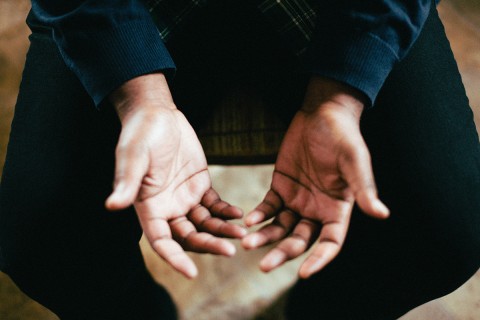What are we really doing when all we can do is pray—or not even?
It may be Easter, but lament comes more readily than alleluia.

A friend recently gave me language I didn’t know I needed: “communion of the helpless.” We were talking about intercessory prayer, pondering the mysteries of a practice so familiar yet sometimes so vexing: What, theologically, are we doing? Why do we think it matters, and what do we believe it accomplishes? Tragedies like coronavirus or terminal cancer can bring questions like these into sharp relief. We are asked to pray for a person or a community in crisis. A desperate plea for someone we love escapes our lips, half-formed and barely breathed, as the heart races or we feel ourselves go numb.
Sometimes these kinds of prayers feel like attempts to wheedle or cajole, to move to action a distant, immovable deity. Sometimes they seem more like hostage negotiations, as we bargain with God to restore a loved one to us safe and well. Many people speak with confidence of “the power of prayer,” summoning “prayer warriors,” as if the outcome they are praying (or fighting?) for is a foregone conclusion. For others, intercessory prayer is not so much about God’s answers as human actions. As Pope Francis puts it, “You pray for the hungry. Then you feed them. That’s how prayer works.”
Read our latest issue or browse back issues.
But the questions persist. What are we doing when all we can do is pray? And what should we do when we are asked to pray and discover we can’t?
Rowan Williams suggests that, at its simplest, intercession is thinking of something or someone in the presence of God. No this for that. No sense that prayer “works” in a cause-and-effect fashion. To ask the question of why some prayers are answered and some are not (did we get what we want?) is to reveal how powerfully, if subtly, metaphors like magic or market exchanges inform our views of prayer. I am reminded of Robert Pirsig’s response, in Zen and the Art of Motorcycle Maintenance, to certain kinds of well-meaning but ill-conceived queries: unask the question. Riffing on the Japanese word mu (“no thing”), Pirsig notes that Zen masters instruct their students to unask questions that presume a context too small for the truth of the answer. Is prayer efficacious? Mu.
Implicit in our understandings of prayer are our working images of God—though perhaps it is difficult to know which comes first, what we think prayer is or who we believe God to be. But for those who struggle to pray—during a pandemic or at any time, really—it might be the Deus absconditus who feels, paradoxically, most present. Martin Luther insisted that the hidden God is God. In his quarrel with the Scholastics, Luther argued that if we start with God’s attributes—God as all-powerful, all-present, all-knowing (qualities that might give us confidence in our praying)—we cannot reason our way to the cross, where God is revealed in suffering and humiliation, and where the cry of dereliction from Jesus’ parched lips is met with a silence that cannot be explained.
It is here, perhaps, where the questions about intercessory prayer meet the inability to pray at all. Luther’s theology of the cross resonates with the experience of God’s hiddenness as lack, shadow, void, negation. There is always the hope, and on some days the conviction, that God is more than this—it is light that creates shadow, after all—but the via negativa traffics in minimalism, and the experience of divine silence sanctions our own loss or lack of speech when prayer is hard to come by.
In A Cry of Absence, Martin Marty describes the “winter of the heart”—another phrase I didn’t know I needed—as the lonely chill, the icy desolation that descends when God is experienced (if that’s the right word) as absence. A wintry spirituality may be born of circumstances—the death of a beloved, for instance—or it may be one’s reflexive state, a preexisting condition of the heart. A wintry spirituality “fuses horizons,” as Marty puts it, with those who exclude God altogether as it reckons honestly with grief, anger, despair, and powerlessness.
If prayer is possible in the winter of the heart and in this time of COVID-19, it might be through the psalms of lament. Those ancient cries of abandonment and loss, when prayed from our own lips, can open a space where we discover that we are not alone in our aloneness. Jesus, having entered the human plane in helplessness and vulnerability, prayed the psalms himself as he was dying, revealing, as Dietrich Bonhoeffer concluded from his Nazi prison cell, that only the suffering God can help. The psalms of lament can also be prayed for someone else, as a way of bringing speech to their pain when they and we are bereft of words and awash in uncertainty.
It may be springtime and Eastertide, but for those of us possessed of a wintry spirituality, for whom lament slips more readily from the tongue than does alleluia, we take consolation in the truth that we are part of the communion of the helpless. We don’t seek fixes. We trust somehow that God’s silence is not a conundrum to solve but a mystery to abide. And if we are sometimes able to pray, it is because, in the struggle to hold together what seems irreconcilable—beauty and suffering and a thousand other things—our wintry hearts trust that there is no place from which the love of God is absent.
A version of this article appears in the print edition under the title “When we can’t pray.”







